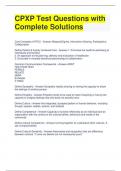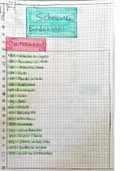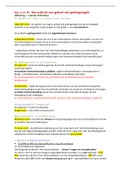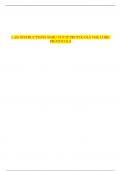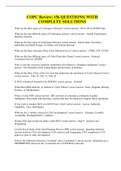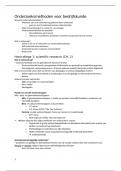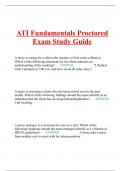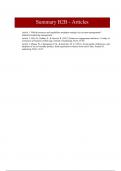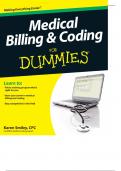Inleiding tot onderzoeksmethodologie
Les 1/2: Onderzoek oriëntatie en design
Les 3: Gastles design science
Les 4: Gastles academisch schrijven
Les 5: Literatuur vinden
Les 6: Kwantitatief onderzoek
Les 7: Kwalitatief onderzoek
1
,Les 1/2: Onderzoek oriëntatie en design
Zie course manual p. 1-15, 23-30
Brug tssn rigor (wetenschappelijkheid) en relevantie
1. Research strategies
• Snel topic afbakenen
• Vos vs egel: vos doet vanalles <-> egel mr 1 ding
=> wet onderzoek = egel: focus op 1 ding (n te veel willen doen)
The Field of Management Disciplines >> sub
Research
Discipline base
Psychology Sociology Anthropology Economics
Organisational Sub Fields Operational
Behaviour/HR Research
Information Accounting
systemst & Finance
Industrial
Relations Strategy
Marketing
Influences on Research 5 zaken waarmee rh bij onderzoek
- Praktische overwegingen
Practical considerations - Epistemologie
- Ontologie
Theory Epistemology
- Waarden
- Theorie
Social Research Sociaal onderzoek: iets/iemand bestuderen, n in lab
Values Ontology
à Praktische overwegingen: tijd, budget, ethiek, wet, financieel, …
(Vr ons n v belang want moeten het n uitvoeren)
à ‘Creating bias’: bias = foutenbronnen, fouten in onderzoek
=> foutenvrij onderzoek bestaat n MR zoveel mogelijk reduceren (fouten zijn cumulatief)
à 4 fasen v onderzoek: design -> data verzameling -> data analyse -> rapportering
A ‘What, Why, and How’ Framework
What? Why?
What puzzles /intrigues me! What do I want to Why will this be of enough interest to others
know more about/understand better? What to be published as a thesis, book, paper,
are my key research questions? guide to practitioners or policy makers? Can
the research be justified as a 'contribution to
knowledge'?
How – conceptually? How – practically?
What models, concepts and theories can I What investigative styles and techniques shall
draw on/develop to answer my research I use to apply my conceptual framework (both
questions! How can these be brought to gather material and analyse it)? How shall I
together into a basic conceptual framework to gain and maintain access to information
guide my investigation? sources?
2
, 2. Schildpad template
Metafoor onderzoeksschildpad: hierover gaat het en nu leg ik er een schild over
Enkel onderzoek over wat erin, rest n -> eenduidig afbakenen
2.1 Hoofd van de schildpad
= research orientation/strategy
= problem statement/research question
= in welke richting ga je? (onderzoeksoriëntatie)
Epistemology and Ontology: continuum Belangrijk continuüm
Ontology: what can we know
Objectivism Constructionism
Epistemology: how can we know
Positivism Interpretivism
à Ontologie: wat is sociale werkelijkheid?
• Objectivisme: ik kan die werkelijkheid kennen (waardevrij)
Bv. mentaal welzijn: bevragen z persoon in kwestie te kennen -> ligt daar ergens, je hebt die en
onderzoeker moet die gwn k capteren (onafh v ‘social actors’)
o Doorlopend geconstrueerd dr mensen -> sociale werkelijkheid verandert elke 10min dr
nieuwe info, kan ook n teruggaan
=> bestaat n zoiets als ‘1 objectieve werkelijkheid’
• Constructionisme: geloofd n in accurate meting
o Sociale werkelijkheid continu dr social actors
o Onderzoekers: keuze specifieke versie sociale realiteit
o Kennis ≠ vast
à Epistemologie: hoe kennis creëren? Gebruik natuurlijke wet vr studie sociale werkelijkheid
• Positivisme: zo goed mogelijk meetinstrument maken opdat zo’n exact mogelijke meting v
objectieve sociale werkelijkheid
o Fenomenalisme = enige fenomeen dus dr zintuigen bevestigde kennis k werkelijk als kennis w
gerechtvaardigd
o Deductivisme: doel hypothesen genereren die we k testen
o Wetenschappers: wet >> normatieve verklaringen
• Interpretivisme: onderzoeker mee in onderzoeksveld -> v binnenuit k begrijpen -> subj
betekenis v sociale actie begrijpen
Bv. antropologie: 2 jaar bij bep groep wonen opdat uitspraak
o Ver tssn mensen/objecten
o Inductivisme: kennis dr verzamelen feiten
OPM: Extremen proberen vermijden
o Helemaal links: empirisisme, als ik het n k meten dan bestaat het n
o Rechts: enige die je ooit helemaal k begrijpen ben jijzelf -> auto-etnografisch onderzoek
(over zichzelf)
Wij? Beetje v beide
OPM: realisme
o Natuur-/sociale wet moeten zelfde aanpak volgen
o Empirisch realisme: werkelijkheid begrijpen ahv passende methoden
o Kritisch realisme: structuren identificeren die gebeurtenissen genereren
3
Les 1/2: Onderzoek oriëntatie en design
Les 3: Gastles design science
Les 4: Gastles academisch schrijven
Les 5: Literatuur vinden
Les 6: Kwantitatief onderzoek
Les 7: Kwalitatief onderzoek
1
,Les 1/2: Onderzoek oriëntatie en design
Zie course manual p. 1-15, 23-30
Brug tssn rigor (wetenschappelijkheid) en relevantie
1. Research strategies
• Snel topic afbakenen
• Vos vs egel: vos doet vanalles <-> egel mr 1 ding
=> wet onderzoek = egel: focus op 1 ding (n te veel willen doen)
The Field of Management Disciplines >> sub
Research
Discipline base
Psychology Sociology Anthropology Economics
Organisational Sub Fields Operational
Behaviour/HR Research
Information Accounting
systemst & Finance
Industrial
Relations Strategy
Marketing
Influences on Research 5 zaken waarmee rh bij onderzoek
- Praktische overwegingen
Practical considerations - Epistemologie
- Ontologie
Theory Epistemology
- Waarden
- Theorie
Social Research Sociaal onderzoek: iets/iemand bestuderen, n in lab
Values Ontology
à Praktische overwegingen: tijd, budget, ethiek, wet, financieel, …
(Vr ons n v belang want moeten het n uitvoeren)
à ‘Creating bias’: bias = foutenbronnen, fouten in onderzoek
=> foutenvrij onderzoek bestaat n MR zoveel mogelijk reduceren (fouten zijn cumulatief)
à 4 fasen v onderzoek: design -> data verzameling -> data analyse -> rapportering
A ‘What, Why, and How’ Framework
What? Why?
What puzzles /intrigues me! What do I want to Why will this be of enough interest to others
know more about/understand better? What to be published as a thesis, book, paper,
are my key research questions? guide to practitioners or policy makers? Can
the research be justified as a 'contribution to
knowledge'?
How – conceptually? How – practically?
What models, concepts and theories can I What investigative styles and techniques shall
draw on/develop to answer my research I use to apply my conceptual framework (both
questions! How can these be brought to gather material and analyse it)? How shall I
together into a basic conceptual framework to gain and maintain access to information
guide my investigation? sources?
2
, 2. Schildpad template
Metafoor onderzoeksschildpad: hierover gaat het en nu leg ik er een schild over
Enkel onderzoek over wat erin, rest n -> eenduidig afbakenen
2.1 Hoofd van de schildpad
= research orientation/strategy
= problem statement/research question
= in welke richting ga je? (onderzoeksoriëntatie)
Epistemology and Ontology: continuum Belangrijk continuüm
Ontology: what can we know
Objectivism Constructionism
Epistemology: how can we know
Positivism Interpretivism
à Ontologie: wat is sociale werkelijkheid?
• Objectivisme: ik kan die werkelijkheid kennen (waardevrij)
Bv. mentaal welzijn: bevragen z persoon in kwestie te kennen -> ligt daar ergens, je hebt die en
onderzoeker moet die gwn k capteren (onafh v ‘social actors’)
o Doorlopend geconstrueerd dr mensen -> sociale werkelijkheid verandert elke 10min dr
nieuwe info, kan ook n teruggaan
=> bestaat n zoiets als ‘1 objectieve werkelijkheid’
• Constructionisme: geloofd n in accurate meting
o Sociale werkelijkheid continu dr social actors
o Onderzoekers: keuze specifieke versie sociale realiteit
o Kennis ≠ vast
à Epistemologie: hoe kennis creëren? Gebruik natuurlijke wet vr studie sociale werkelijkheid
• Positivisme: zo goed mogelijk meetinstrument maken opdat zo’n exact mogelijke meting v
objectieve sociale werkelijkheid
o Fenomenalisme = enige fenomeen dus dr zintuigen bevestigde kennis k werkelijk als kennis w
gerechtvaardigd
o Deductivisme: doel hypothesen genereren die we k testen
o Wetenschappers: wet >> normatieve verklaringen
• Interpretivisme: onderzoeker mee in onderzoeksveld -> v binnenuit k begrijpen -> subj
betekenis v sociale actie begrijpen
Bv. antropologie: 2 jaar bij bep groep wonen opdat uitspraak
o Ver tssn mensen/objecten
o Inductivisme: kennis dr verzamelen feiten
OPM: Extremen proberen vermijden
o Helemaal links: empirisisme, als ik het n k meten dan bestaat het n
o Rechts: enige die je ooit helemaal k begrijpen ben jijzelf -> auto-etnografisch onderzoek
(over zichzelf)
Wij? Beetje v beide
OPM: realisme
o Natuur-/sociale wet moeten zelfde aanpak volgen
o Empirisch realisme: werkelijkheid begrijpen ahv passende methoden
o Kritisch realisme: structuren identificeren die gebeurtenissen genereren
3

